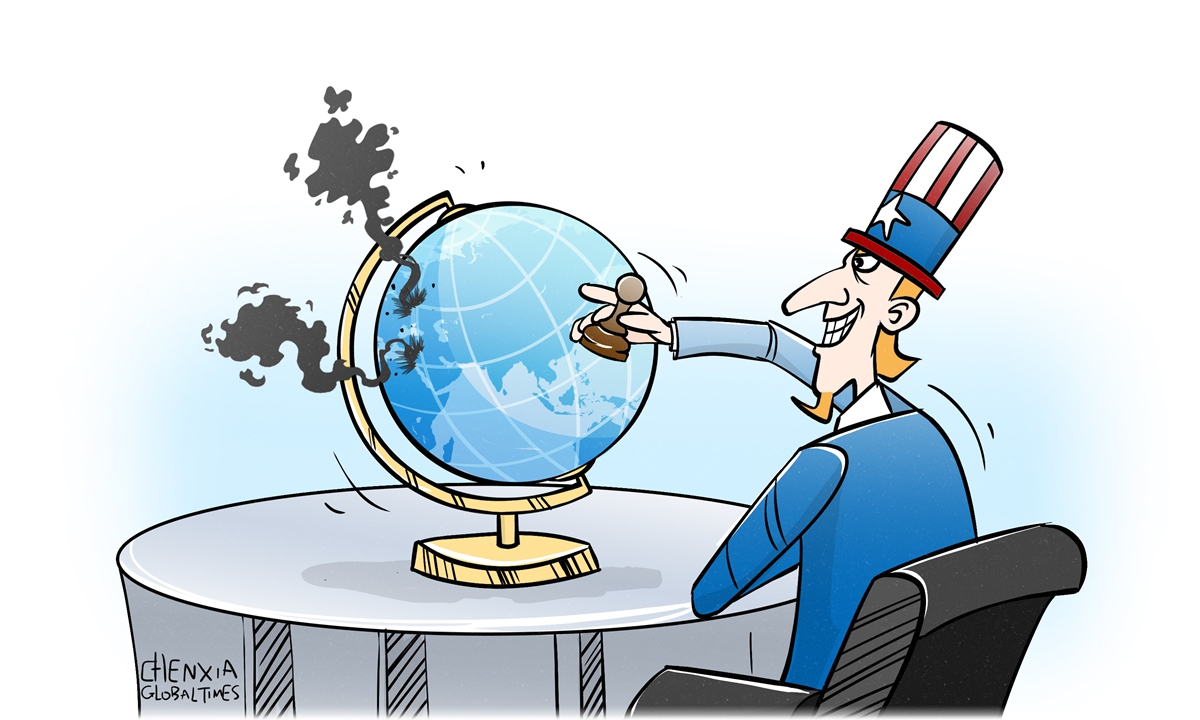
Illustration: Chen Xia/ GT
Today, no one can underestimate the possibility of a world war breaking out. The world is rapidly polarizing and this polarization is evident across major dimensions including economic, ideological and geopolitical. It is crucial to emphasize that this polarization is being engineered from the top down - artificially - rather than emerging organically from the bottom up.
First, there is economic polarization. Globalization once implied the integration of the world economy. If globalization was a process dominated by capital with government support, then economic polarization is now a process where governments dominate and capital complies. When former US president Donald Trump first initiated a "trade war" with China, few could have anticipated the rapid downturn in global economic and trade conditions to the current situation. Trump's high tariffs policy quickly evolved into US President Joe Biden's comprehensive polarization policy. Almost all empirical evidence indicates that the situation of "one world, two markets" has taken shape.
Second, there is ideological polarization. The US and Western countries have found that as China has risen in the process of globalization, it has not only rejected becoming another "Western country" but has also developed with more distinct "Chinese characteristics." In this context, the US has once again resorted to ideological opposition, defining its relations with China from an ideological standpoint as a competition between "democracy" and "autocracy." If cognitive warfare in economics is more about influencing overseas investors to prevent them from choosing China, ideological cognitive warfare targets not only the national society but also the Chinese domestic population.
Third, and most importantly, there is geopolitical polarization. Washington has clearly defined China as a country that "harbors the intention and the capacity to reshape the international order" to compete with the US globally. Its direct objective of geopolitical strategies is to contain and restrain China. In this regard, the US has established several minilateral groupings around China's periphery. At the international level, the US academic community of international relations is accelerating the shaping of a new concept, namely "Global East," which lumps together China, Russia, Iran and North Korea, framing these countries as constituting a global "autocratic camp."
The possibility of a world war may have been underestimated. Looking at today's situation, regional wars involving multiple countries, especially major powers, have already broken out, such as the Russia-Ukraine conflict. While the wars in the Middle East have manifested themselves mainly as a conflict between Israel and Hamas, many other countries, especially the US, have become deeply involved. It can also be argued that it is the multinational involvement that has given these localized conflicts a protracted character that no one had anticipated.
Since the advent of nuclear weapons, people have often believed that a world war involving major powers is no longer possible, as a war between two nuclear states would mean mutual destruction. However, such an argument has greatly underestimated the possibility of wars emerging in non-nuclear forms. In fact, nuclear weapons have not only failed to eliminate war but have also led to war in other forms. Nuclear weapons "encourage" nuclear-armed states to use violence and war to achieve their goals in a different way, because nuclear-armed states believe that their counterparts will not use nuclear weapons for mutual destruction, they are more likely to resort to violence and war.
Therefore, when people talk about world wars now, the issue to discuss is not whether a world war is possible, but which form it would take. Similarly, today, the development of AI and its widespread application in other fields, especially in the military, are expanding the complexity and diversity of war. Ignoring different forms of war can lead to significant strategic errors. War is the "ultimate expression" of human nature, but the form of war is changing because human nature can be "civilized."
The remaining question is, where could the main battlefield of the world war be, the Middle East, Europe or the Asia-Pacific? The Israel-Hamas conflict is still continuing in the Middle East, but this localized war is hardly likely to develop into a world war by any measure. At the same time, it can be said that the Russia-Ukraine war is entering a "decline" phase, while conflicts in the Asia-Pacific region are experiencing an upward trend.
The US and the entire West are shifting toward the Asia-Pacific. Recently, they have been engaged in cognitive warfare, attributing Russia's "invincibility" in its conflict with Ukraine to China's so-called support. The implication is that it is because of China's support that Russia is able to sustain a war. To a large extent, Washington's cognitive warfare has been effective, successfully directing Europe's strategic attention to the Asia-Pacific region.
For the US, the Asia-Pacific region becoming a "powder keg" is the ultimate means of victory. The US claims to be the guardian of peace in the region, but in fact, it has been dividing Asia-Pacific, creating conflicts across the region to an extreme extent. The ruling elite in the US seems to be trapped in an extreme fear of China. For the US, as long as it can defeat China and emerge as the ultimate "winner," it is willing to risk the destruction of the whole of Asia through war. As some extreme anti-China forces in the US openly declare, Washington's goal in its contest with China should indeed be victory.
The most serious challenge to China is how to respond effectively to the fact that the US is creating a confrontational atmosphere around China, leading the world war to the Asia-Pacific region, and ultimately realizing its strategic goal of encircling and containing China.
The author is a professor at the Chinese University of Hong Kong, Shenzhen and president of The Institute for International Affairs, Qianhai. opinion@globaltimes.com.cn




